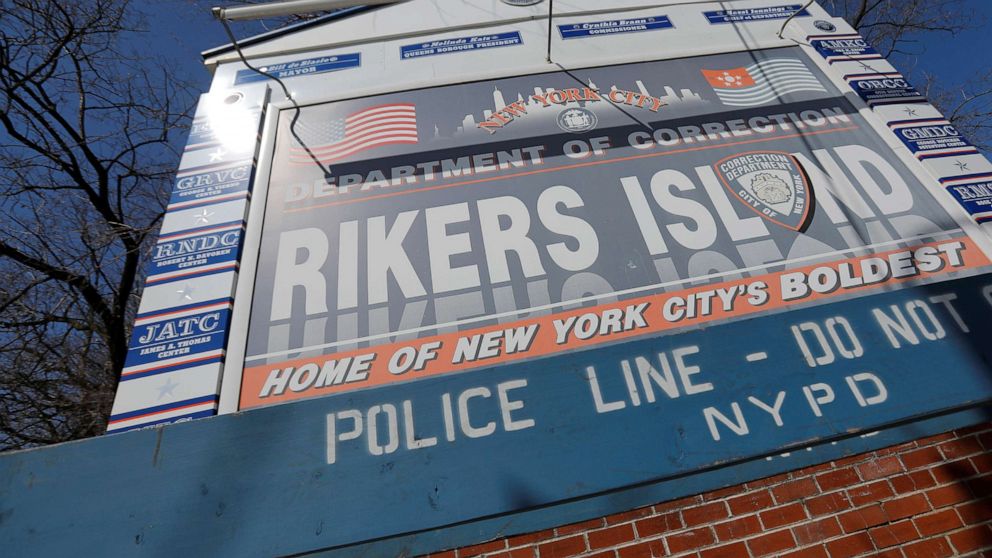Shampoo, watery soap to disinfect: Conditions on Rikers Island during COVID-19 unsafe, some inmates say
Social distancing, staying 6 feet apart and cleaning surfaces with anti-bacterial products are some of the tools health experts and government officials have drilled into the minds for everyone around the world to do in order to prevent the spread of the novel coronavirus. But, for the thousands of inmates on Rikers Island, some detainees say those options were not possible.
"It took two days to get a bed. I had to lie on the floor in intake with about seven other people, not within 6 feet of each other, but 6 inches. Two days of that on a concrete floor. Very unsanitary, no one was taking precautions, no one had masks, no wiping down with antibacterial cleaning supplies," said Bill, who asked that ABC news not use his last name for fear of law enforcement retaliation.
Bill, 62, said he was taken into custody by the police from the airport to Queens County Criminal Courthouse where he learned that there was a December 2017 tampering with public records charge against him in New Jersey that he did not know about. He was denied bail on March 15 by a Queens Criminal Court judge who adjourned his case for 30 days.
A law enforcement source familiar with the case told ABC News that the judge did not have any authority to set bail because it was a fugitive warrant.
That same day, a Rikers correction staffer contracted the novel coronavirus known as COVID-19.
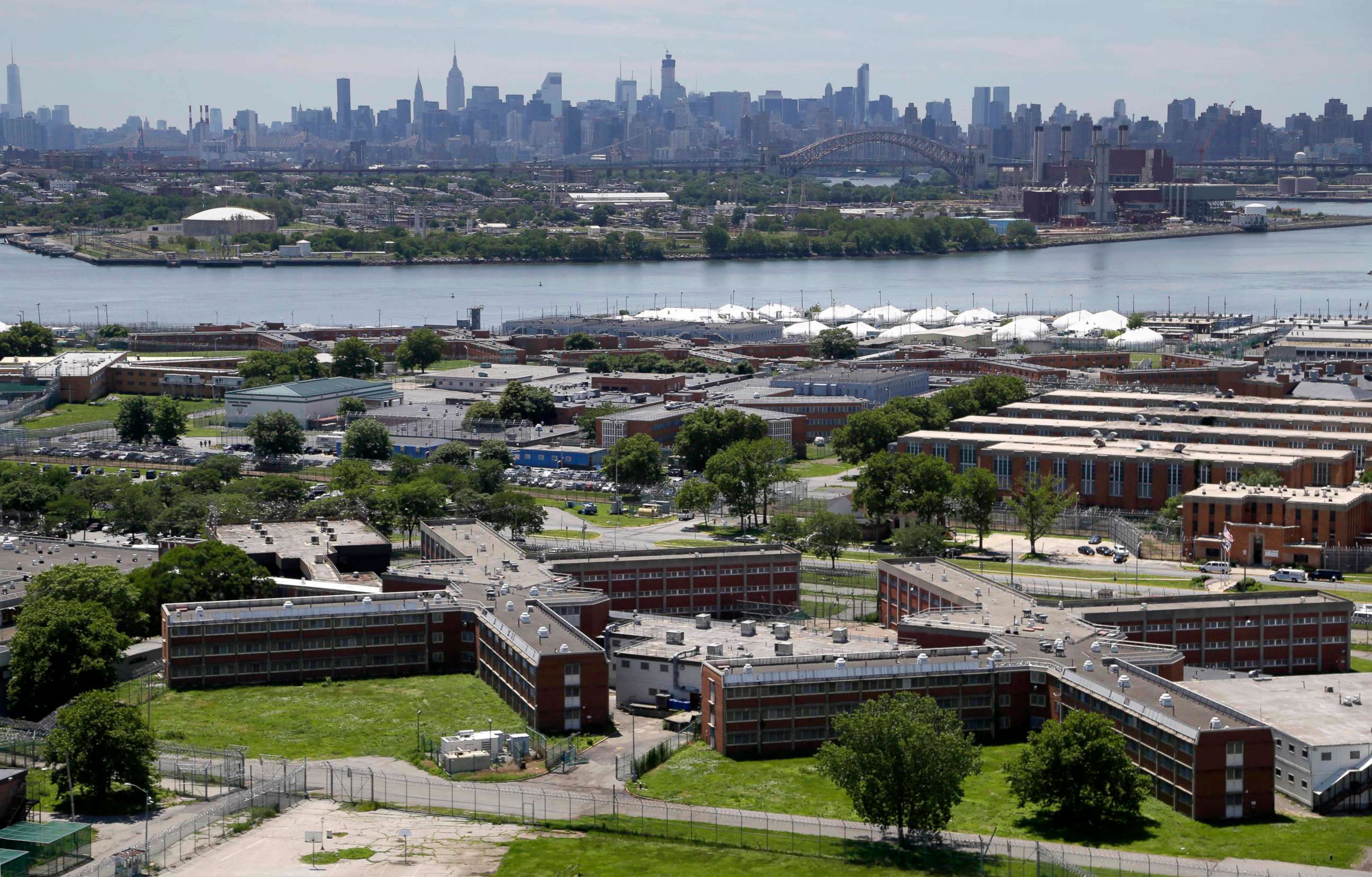
Since New York State's first coronavirus case was reported on March 1, the numbers have swelled into the thousands. The state has become the epicenter of the pandemic virus which was first detected in Wuhan, China, on Dec. 31 and hit the United States on Jan. 21 in Washington state.
Rikers Island, which sits in the East River between Queens and the Bronx, is one of the world's largest correctional institutions and has become the target of activists calling to shut it down. It currently houses about 4,800 inmates and can hold up to 15,000.
And some say they are afraid of contracting coronavirus.
"We had heard about the virus being on Rikers on the news. A week later they were handing out one sheet of paper saying not to cough in your hands, to cough into the fold of your arms, wash your hands frequently, clean all main surfaces, door knobs, table tops," said Jimmy, who also withheld his last name to protect his identity from law enforcement.
Jimmy, 55, from Queens, New York, was serving a year sentence for petty larceny when COVID-19 spread to Anna M. Kross Center on Rikers Island. He said that although inmates were given instructions about cleaning, they weren’t provided supplies to do so.
Both former detainees told ABC News in separate phone interviews that being in jail was bad enough, especially coupled with a viral and possibly deadly infection floating around.
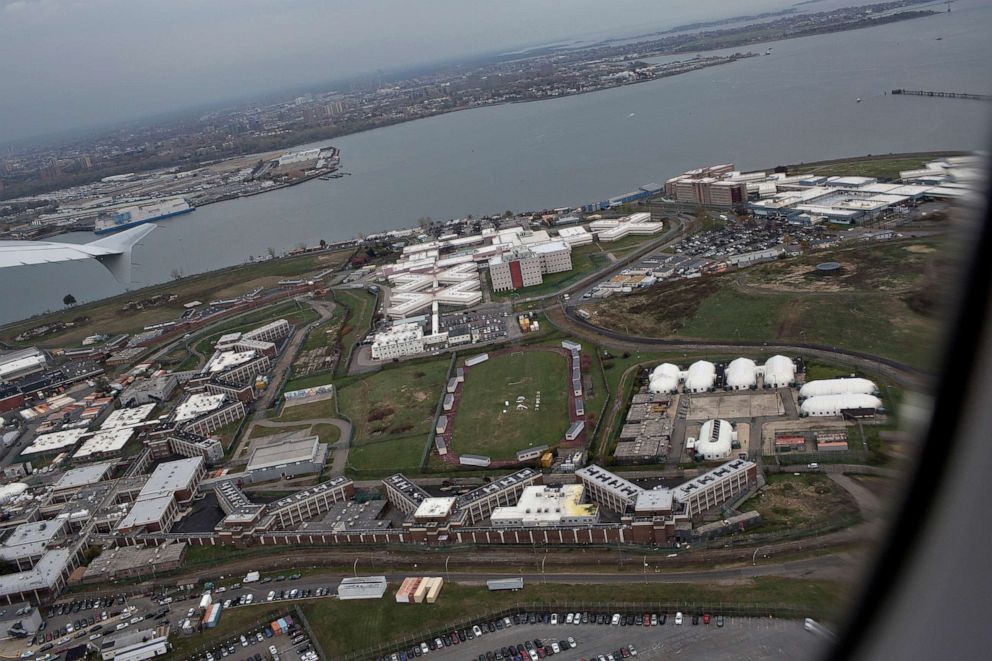
After Bill was transferred to a cell on March 17 in the Vernon C. Bain Center, the next day, the first correction officer and an inmate tested positive.
"There is no cleaning staff, they rely on the inmates to clean," said the retired attorney.
"We took it upon ourselves to use items from commissary to clean. We used shampoo, crushed the soap and added water to stretch it out and clean the surfaces," said Jimmy who said he was housed in a dormitory with almost 50 other inmates.
A spokeswoman with the DOC rebuts the former inmates' claims about their cleaning methods, saying they cleaned and sanitized the facility daily and their preventative cleaning methods started March 3.
Officials put protocols in place like cleaning the showers three times a day, sanitizing all common areas and supply inmates with cleaning supplies for free, the spokeswoman said. A process has also been implemented for supervisors to check and log the housing areas at least three times per shift for cleanliness and need for cleaning supplies, she added.
"The Department is committed to robust sanitation protocols throughout its facilities and transportation vehicles, and has ramped up existing cleaning policies to combat the potential spread of the coronavirus," she told ABC News on Saturday. "The Department has confirmed that its current sanitation formula is effective against the coronavirus."
The DOC also uses a mold and mildew cleaner, an EPA-approved disinfectant, a general cleaner, neutral floor cleaner, and a cleaner without grit, according to a law enforcement source familiar with the facility.
But when it comes to ongoing preventative measures, Jimmy said they should have received gloves and masks as well.
"The COs were wearing gloves and mask, but it made no sense because we, the inmates, aren't going out to court or anywhere they are or the visitors are coming in," said Jimmy, referring to the correction officers.
Social distancing, quarantining and stay-at-home orders are all measures established by local, state and federal authorities to help stop the spread of the virus, according to the CDC, but there is no way to adhere the guidelines while in jail, the former inmates said.
"Everyone is within 3 to 4 feet of each other," said Bill. "The ceilings are very low, stagnant air, people smoking marijuana, exchanging marijuana with each other," said Bill, adding, "We aren't let out except an hour a day. At meals everyone is in 3 inches of each other."
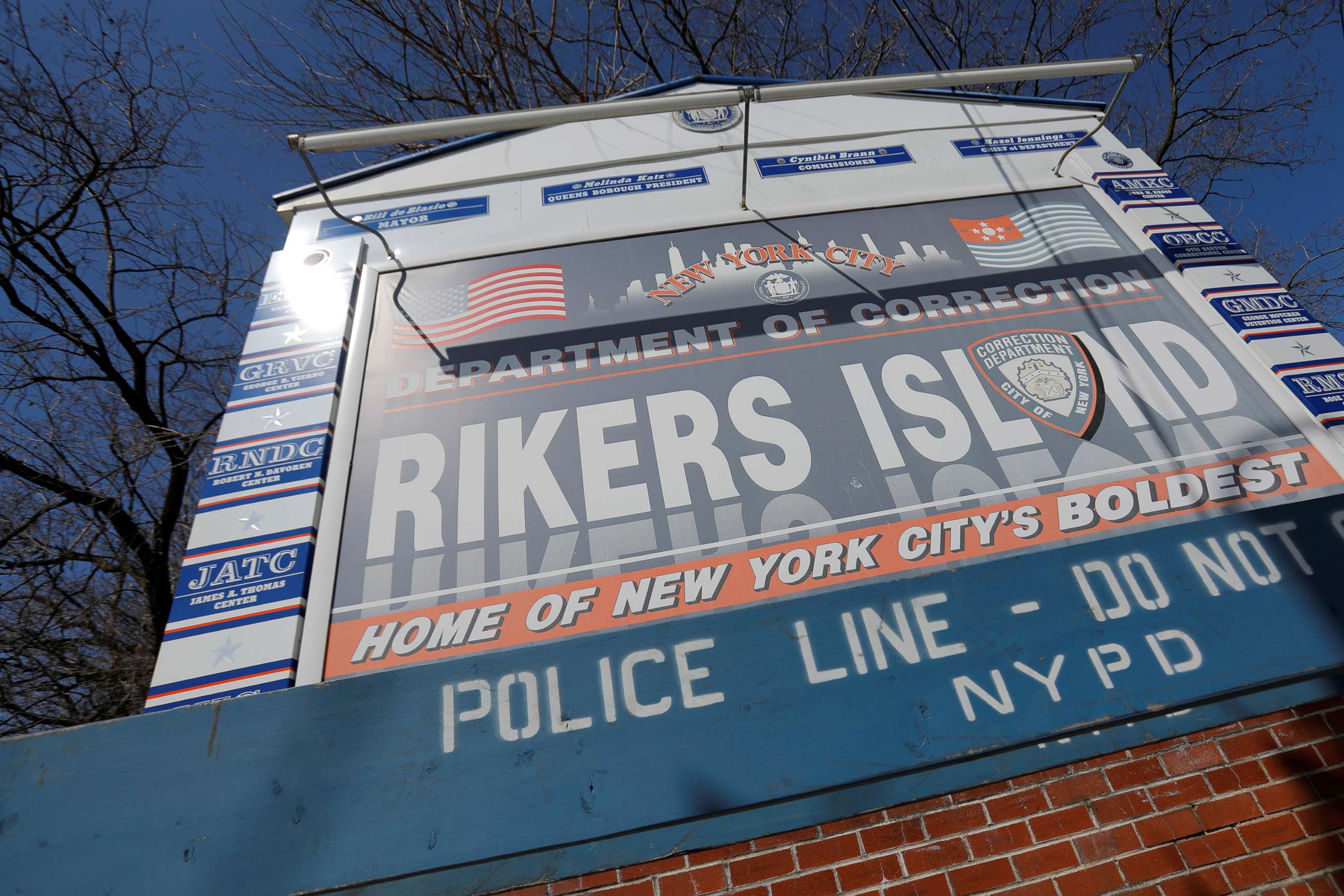
"People were eating where they slept. You are elbow-to-elbow -- right on top of one another," said Jimmy, noting the only privacy available was during shower time.
Ill inmates can get an appointment with a medical professional either at the West Facility on Rikers or at Bellevue Hospital in Manhattan, but Jimmy says that can sometimes take two weeks because of the "backlog of detainees."
"The guy right next to me had serious respiratory issues, no idea what was wrong with him, but he had trouble breathing and he kept it to himself," said Bill.
Last weekend, The City, an online news outlet that covers New York City, reported that eight inmates at Rikers Island were pepper-sprayed while trying to go to the jail's clinic after an inmate they were housed with was removed from the area for displaying flu-like symptoms.
The incident is under investigation, authorities told ABC News on Saturday.
Even before the virus claimed more than 32,000 lives to date worldwide, advocates like The Legal Aid Society, the City Corrections Officer Benevolent Association (COBA) and elected officials have called for measures to protect officers and inmates from the potential of spreading the coronavirus.
Maryland's Prince George County State Attorney Aisha Braveboy's, announced on March 18 they would release low-level offenders from jail as a proactive measure. As of Tuesday, 62 inmates were released, a spokeswoman with SA Braveboy's office told ABC News.
The Cuyahoga County Court in Ohio announced on March 12 that it was releasing hundreds of inmates under various circumstances from the Cuyahoga County Jail due to coronavirus concerns.
The New York Times first reported on Monday, that New Jersey officials signed an order to release 1,000 inmates across the state. The consent to commute or suspend county jail sentences order was signed on Sunday by the state's Attorney General Gurbir S. Grewal, American Civil Liberties Union (ACLU) of New Jersey and other agencies.
New York City Mayor Bill de Blasio initially announced on March 19, the release of 40 inmates and then increased the amount to 375 on Thursday at a daily COVID-19 press conference. The mass release of inmates brought the Rikers Island population to its lowest since 1949, de Blasio said.
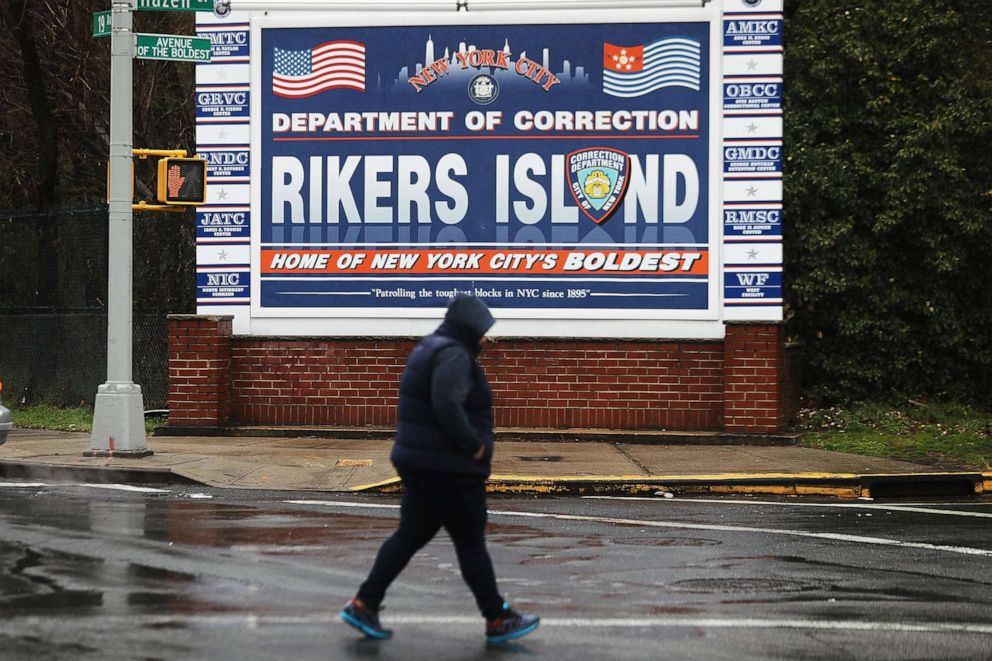
Under the mayor's order, Jimmy's sentence was amended and he was released on March 24. He had a week left to serve. Bill was released on March 20 after the extradition was declined by New Jersey prosecutors, but his case is still pending.
On Friday, Gov. Cuomo announced releasing 1,100 inmates across the state who are in jail for low-level technical parole violations parole.
The Legal Aid Society also filed a lawsuit on Thursday calling for at least 10 juvenile offenders to be released as well.
Now that hundreds of inmates were released from Rikers Island, officials said there will be room to practice social distancing by placing an empty bed in between inmates. They have also reopened an unused facility to place new inmates who show symptoms for the coronavirus and for those in custody who have tested positive for COVID-19.
"The health and well-being of every person in our facilities is always our first priority. We are taking every precautionary measure to keep people in custody safe," said Peter Thorne, the deputy commissioner for public information with the DOC, in statement to ABC News on Wednesday. "We will continue to update our COVID-19 guidance as necessary, per the city's Department of Health and Mental Hygiene, to keep those in our facilities safe and healthy."
As of Sunday, 114 DOC corrections officers and 139 inmates have tested positive for COVID-19.
What to know about coronavirus:
- How it started and how to protect yourself: Coronavirus explained
- What to do if you have symptoms: Coronavirus symptoms
- Tracking the spread in the US and Worldwide: Coronavirus map
